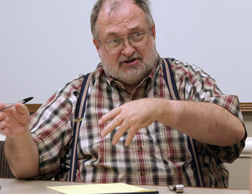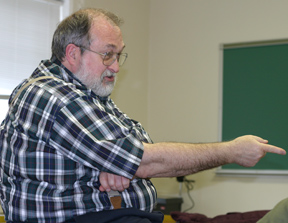 A Wabash College professor can only win the prestigious McLain-McTurnan-Arnold Excellence in Teaching Award once in his or her tenure. Even though David Blix, a philosophy and religion professor, received it at the end of this past school year, he routinely ranks among the favorite instructors of students in their senior interviews with the dean.
A Wabash College professor can only win the prestigious McLain-McTurnan-Arnold Excellence in Teaching Award once in his or her tenure. Even though David Blix, a philosophy and religion professor, received it at the end of this past school year, he routinely ranks among the favorite instructors of students in their senior interviews with the dean.
That admiration may have come in handy for Blix while he was working on a scholarly study of integrative learning in the liberal arts.
Blix, 58, links his popularity with his pupils to being a firm teacher who makes himself available.
"On the one hand, I try to maintain high standards," he said. "I don't think of myself as an easy teacher. My sense is students like the challenge. They'd rather have somebody challenge them or push them, rather than let them just skate by.
"But it's not just that, I think. Part of being a good teacher is having a basic care for the students, a concern. Saying less, listening more on certain occasions. Inviting them to express their opinions. Taking them seriously."
Blix, who earned his Ph.D. in religion from the University of Chicago, attends practically every recital, lecture and sporting event on campus, as many as he can make it to.
"It's part of the life of the college, part of the culture," Blix said. "It's important that all of us — the faculty in particular — be involved in that. I don't go just because it's the students putting on a recital or something like that. I go because I like it. It's important and I learn something from it. It's part of the way we show interest in students. We honor what they're doing. One of the most pleasant experiences I can have at the college is after (an event) go up to the students and say that was really good. You did that well. And I think that's important."
 All are attributes that endear Blix to Wabash College. And ones that helped him in researching how students take the many disparate elements of a liberal arts education and connect them into something that will help them in the outside world.
All are attributes that endear Blix to Wabash College. And ones that helped him in researching how students take the many disparate elements of a liberal arts education and connect them into something that will help them in the outside world.
Blix was accepted as a scholar for the Carnegie Academy for the Study of Teaching and Learning (CASTL) for the 2005-06 school year. For his research, he interviewed 24 Wabash students — mostly seniors but some juniors and sophomores and one freshman — asking them about key moments in their time at Wabash and suggestions for improving the college's curriculum.
In his analysis, two themes emerged. Although overlapping, Blix said students seem to separate themselves into two groups — one that seeks integrative learning between distinct subjects and another that seeks practical application of what they've learned.
Blix plans to take his findings to Wabash's Center of Inquiry in the Liberal Arts. The college is in the midst of scrutinizing its overall academic program, a process done every 20-30 years.
"We need to have a curriculum that allows for interdisciplinary bridge-building and practical application in the real world," he said.
If there's one thing Blix has learned over the years — and continues to learn today — is that self-evaluation and appraisal from students and peers helps make for effective tutelage.
"One of the hardest things to do as a teacher is (take criticism from your students)," Blix said. "But one of the things I've learned to get past that is (to ask) what didn't work. Part of being a good teacher is getting past the sense of ego, which we all have, and learning to receive that feedback and saying I can improve."